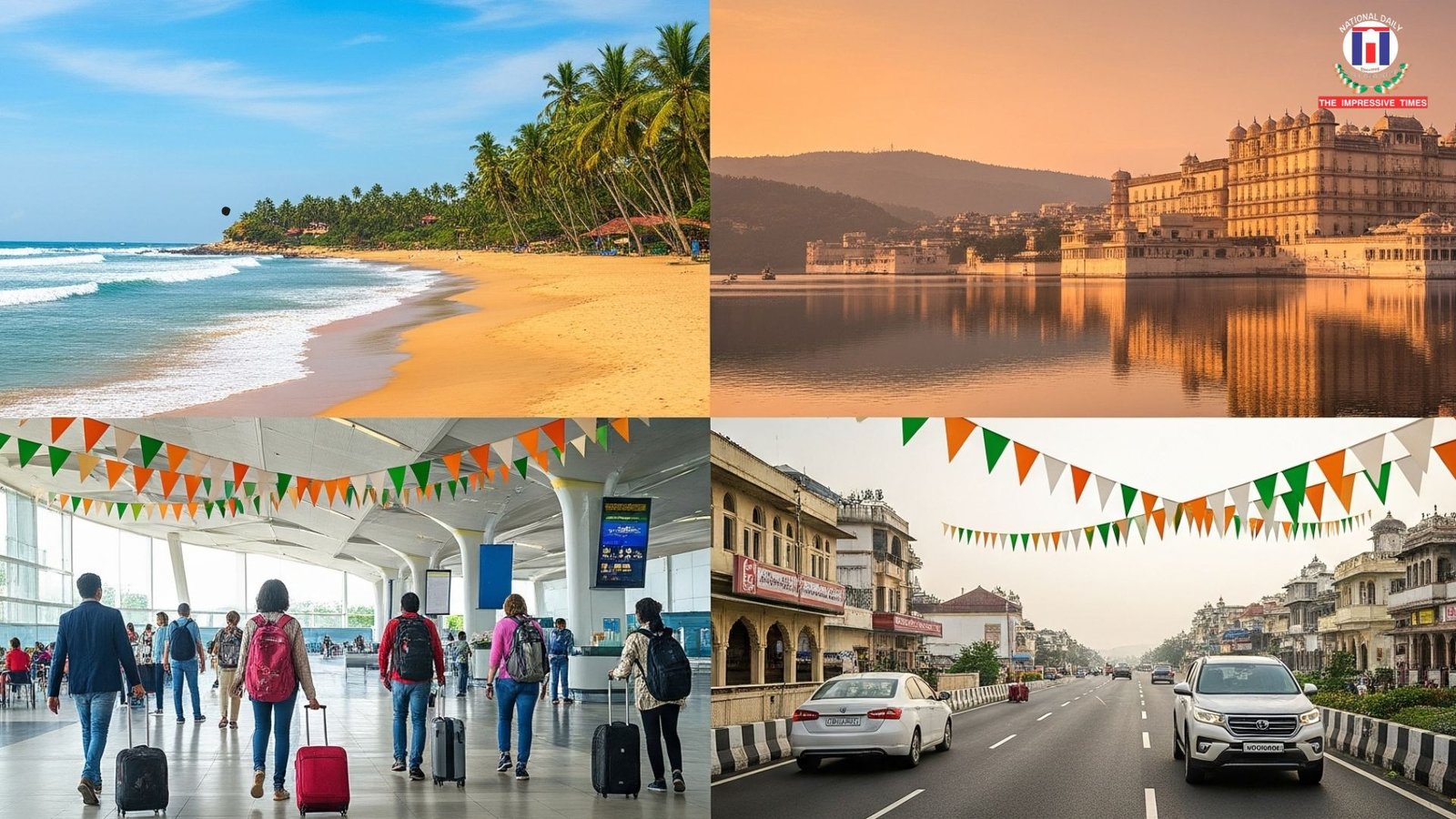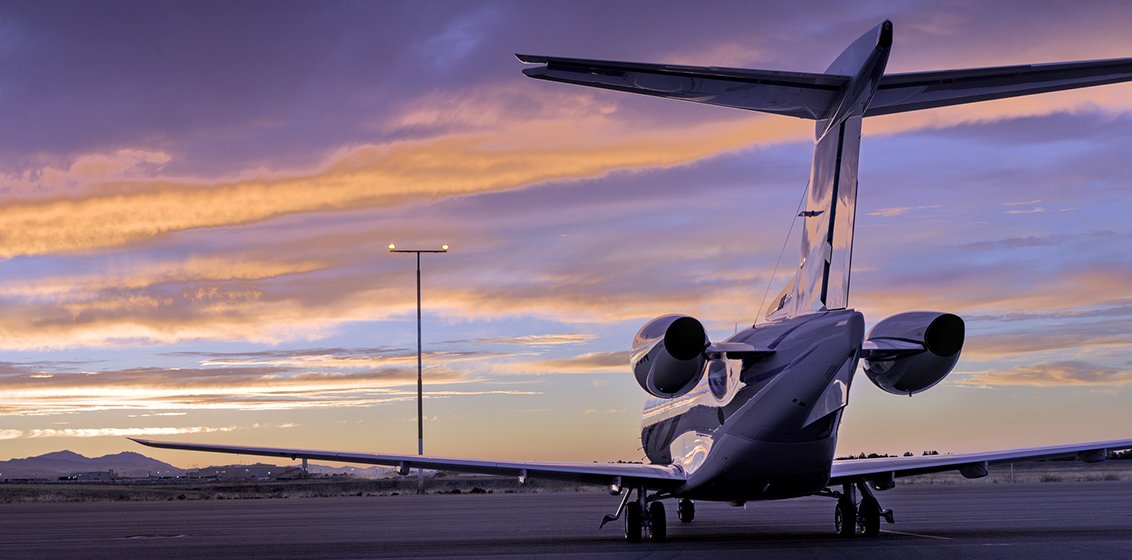Travel Trends
Bookings Rise, Airfares Double, Hotels Fill Up

Airfares double, hotel rates climb as Goa, Udaipur, and Mysuru lead the Independence Day travel rush
TIT Correspondent
info@impressivetimes.com
As the nation gears up to celebrate Independence Day, travel trends are witnessing a sharp shift, with domestic tourism seeing an unexpected surge. Popular leisure destinations such as Goa, Udaipur, and Mysuru have emerged as top choices for holidaymakers, driving up demand in both air and accommodation bookings.
Industry trackers report that airfares to Goa have doubled compared to last week, with limited seat availability on prime dates. This steep rise in ticket prices reflects the last-minute rush among travellers eager to make the most of the long weekend. In parallel, hotel tariffs in tourist hotspots have recorded a hike of 20 to 30 percent, as premium properties and boutique resorts report near-full occupancy.
Travel aggregators also note a growing preference for “drivecations” — short, road-based getaways to scenic spots within a few hours’ drive from major cities. For residents of Mumbai and Pune, hill stations like Lonavala and Mahabaleshwar are seeing heavy footfall, with homestays and luxury villas in high demand. These destinations offer travellers the flexibility of last-minute planning, making them a convenient option for those avoiding the unpredictability of air travel costs.
Experts attribute this surge in bookings to a combination of factors: the mid-week Independence Day holiday aligning with extended leave plans, pent-up travel demand post-monsoon, and a desire to combine patriotic celebrations with leisure travel. Tourism operators expect the trend to boost local economies, as restaurants, transport services, and small-scale vendors in these destinations benefit from increased foot traffic.
With only days left before August 15, travellers are being advised to confirm bookings promptly, as rates are projected to climb further. The Independence Day rush, industry insiders say, could set the tone for a strong festive travel season ahead.
Travel Trends
Travel News on August 8: Air Canada Strike, New TSA Tech, Visa Shifts and Global Tourism Trends

Published on
August 9, 2025 |
By: Tuhin Sarkar
Atlanta, USA, August 8- Travel news on August 8 is dominated by major developments that are set to reshape global journeys. The Air Canada strike looms large, with flight attendants ready to walk out, threatening schedules across key hubs. New TSA tech is making headlines too, as biometric systems promise faster and more secure airport checks.
Meanwhile, visa shifts are changing travel access in multiple regions, influencing everything from tourism plans to business trips. These updates come as global tourism trends point to record-breaking demand, with destinations worldwide welcoming a surge in visitors.
The Air Canada strike, new TSA tech, visa shifts, and booming global tourism trends together mark August as a month of both turbulence and opportunity for the travel industry. From labour unrest to innovation and policy change, August 8 stands out as a critical moment in shaping how millions will move across the world.
Air Canada Faces August 11 Strike Across Major Hubs
Air Canada flight attendants are preparing for a high-impact strike on August 11, targeting the airline’s busiest hubs — Montreal, Toronto, Vancouver, and Calgary. The Canadian Union of Public Employees (CUPE) says the walkout is driven by disputes overpay and working conditions, with claims that current offers fail to match the job’s demands, especially after years of post-pandemic strain.
The timing is critical. August is peak summer travel season, and Air Canada is the country’s largest carrier, responsible for a major share of domestic, transatlantic, and US-bound connections. Airports are warning passengers to brace for long lines, overcrowded terminals, and possible last-minute cancellations. Travel experts say disruption could ripple into the US and Europe through connecting flights.
TSA Expands Biometric Screening Across Key US Airports
In the United States, Denver International Airport has joined Atlanta, Chicago O’Hare, Dallas Fort Worth, and New York LaGuardia in rolling out biometric facial recognition for TSA checkpoints. The system allows eligible TSA PreCheck travellers to pass security without showing a physical ID or boarding pass.
While the move is part of a wider effort to create faster, touchless, and more secure screening, TSA has advised travellers to keep IDs handy. Technical glitches, outages, or incomplete biometric profiles can still require passengers to revert to traditional screening.
US Tightens African Visa Rules, Canada Warns on China Travel
The US has paused routine visa applications from Zimbabwe, adding to a growing list of African travel restrictions. This follows a controversial $15,000 bond pilot for travellers from Malawi and Zambia, a move critics say could hinder tourism and academic exchanges.
Meanwhile, Canada has joined Australia, the US, and the UK in issuing updated travel advisories for China, warning citizens about risks of arbitrary detention and exit bans.
Visa Changes Boost Tourism in Europe
On the other side of the travel spectrum, several European destinations are reaping rewards from updated ETIAS requirements and Schengen visa changes. Countries like Belgium, Germany, Italy, Spain, France, Turkey, and the UK are seeing tourism levels match or exceed last year’s highs.
Pent-up travel demand, coupled with increased flight options, is helping these nations sustain growth. The Schengen area’s 29-country passport-free system continues to be a major draw for long-haul travellers.
Airlines Shift Loyalty Programs and Battle Cyber Threats
Air Canada has also joined American Airlines, Delta, United, JetBlue, British Airways, and others in shifting loyalty programs to a revenue-based model, rewarding dollars spent rather than miles flown. While the move aims to reward higher-spending customers, frequent flyers who book low-cost tickets could see reduced benefits.
In parallel, major carriers including KLM, Air France, Aeroflot, Qantas, WestJet, and United have reported cyber security incidents in recent months. These range from IT outages to confirmed data breaches. Industry analysts warn that cyber resilience is becoming as important as operational reliability.
Record-Breaking Tourism in the US and Canada
In the US, Happy Valley, Pennsylvania, recorded $1 billion in visitor spending for 2024, driven by Penn State football weekends and year-round cultural events.
Meanwhile, music tourism continues to boom, with major concerts by Katy Perry, Chris Stapleton, and others drawing fans across state lines.
In Canada, the Toronto International Film Festival remains one of the nation’s top tourism magnets, filling hotels, restaurants, and cultural venues every September.
A Travel Industry in Flux
From labour unrest and cyber threats to booming cultural tourism and shifting visa landscapes, August is shaping up as a month of both turbulence and opportunity for the travel industry. The coming weeks will reveal whether operational disruptions outweigh the gains from surging demand — or if travellers and airlines can navigate both challenges and growth.
Travel Trends
Canadians Shift Travel Plans Away from US Amid Ongoing Trade War: Where Are They Going Now?

Published on
August 9, 2025 |
The ongoing trade war between the US and Canada has sparked significant changes in travel trends. As tensions escalate, many Canadians are reconsidering their travel plans to the United States, opting instead for international destinations. This shift is primarily due to the ongoing political climate and trade disputes, which have made some Canadians wary of spending money in the US. As a result, countries in Europe, South America, and Asia are seeing an increase in Canadian travelers. This change is not only reflected in travel spending but also in the destinations people are choosing. Cities like Buenos Aires, Osaka, and Copenhagen are now becoming popular alternatives for Canadians who previously favored US destinations. This evolving travel behavior highlights a broader shift in attitudes, where Canadians are prioritizing destinations that offer not only better value but also a sense of security and welcome amid the political turbulence of the Canada-US relationship.
Changing Attitudes Toward U.S. Travel
Many Canadians who previously visited the US for vacations, business, and leisure are now opting for other destinations. Take Kelly Bergquist, an Edmonton native, for example. She used to visit the U.S. at least once a year, but with the rise in trade disputes and a difficult political atmosphere, she now finds herself reconsidering her travel options. Bergquist shared that the ongoing issues with the U.S. made her feel uneasy about spending money there.
This sentiment reflects a broader shift in Canadian travelers’ attitudes. While many would have readily chosen U.S. destinations in the past, the current geopolitical climate is pushing people toward exploring international alternatives. Instead of the U.S., Bergquist has shifted her focus to more distant locales, such as the Balkans in southeastern Europe and Mexico.
Surge in Travel Spending for Alternative Destinations
The recent data from Flight Centre Canada confirms this shift. Between May and July 2025, travel spending to countries like Argentina, Japan, and Denmark saw significant growth compared to the previous year. Buenos Aires, Argentina, witnessed a 148% increase in Canadian travel spending, while Osaka, Japan, saw a rise of 137%. Cities like Copenhagen, Denmark, and Curaçao in the Caribbean also reported increases of over 100%. Other destinations such as Aruba and Lisbon saw notable jumps in travel activity as well, further underscoring the shift away from U.S. travel.
Flight Centre Canada data reveals that while travel within Canada is seeing some uptick, many Canadians are turning to international destinations instead of venturing south. According to the data, spending in destinations like Lisbon, Portugal (61% increase), and Prague, Czech Republic (38% increase), shows a marked preference for overseas travel. The trend highlights a broader movement to countries offering rich cultural experiences and possibly more stable political environments.
More Canadians Opting for International Getaways
The shift is not just a change in spending; it’s evident in the volume of Canadian travelers visiting international destinations. The Japan National Tourism Organization reported a 23% increase in Canadian visitors in the first half of 2025, compared to the same period last year. Similarly, Turismo de Portugal highlighted a 6.5% increase in Canadian visitors between January and May 2025.
Countries in South America are also benefiting from this change. Brazil saw a 12.9% increase in Canadian visitors from January to June 2025, according to Visit Brasil. This is a notable growth pattern, as Canadian travelers seek to avoid the U.S. in favor of destinations that offer not only new experiences but also a sense of welcome.
Canadians Rethink Short Getaways and Plan Longer Trips
Andrew Stafford, a manager at Flight Centre in Vancouver, noted that many Canadians are opting to extend their trips. Instead of taking shorter weekend trips to U.S. destinations, they are now planning longer vacations to more distant places. The trade war and political tensions with the U.S. are increasingly top of mind for Canadian travelers, and they are choosing to invest their time and money in more diverse and far-reaching trips.
According to Stafford, while Canadians are still traveling at similar rates to previous years, they are choosing destinations that offer a better experience and a sense of security. Travelers are making decisions based on a variety of factors, including the overall political climate, exchange rates, and flight availability.
The Impact on US Tourism
Tourism operators in the U.S., especially those in border states and cities like New York, Las Vegas, and Florida, are starting to feel the effects of the changing travel patterns. Historically, Canadians have been one of the largest groups of international visitors to the U.S., but recent shifts in travel preferences may have long-term implications.
For example, the Marival Group, a Canadian-owned hotel chain in Mexico, has seen a rise in Canadian visitors since the onset of the trade dispute, according to the company’s vice president of sales and marketing, Salvador Ramos. The company has seen an increase of about 5-6%, translating to approximately 15,000 more Canadian visitors at its resorts. The company has doubled down on digital campaigns targeting Canadian cities like Calgary, Ottawa, and Winnipeg, further capitalizing on the growing trend of Canadian travelers heading to Mexico.
The Shift Toward Feeling Safe and Welcome
For many Canadians, the political climate in the U.S. is a key consideration when choosing where to travel. Joan Allison of Windsor, Ontario, once spent months every year in the U.S., but now, due to the growing political tensions, she has decided to opt for international destinations instead. Allison, like many others, expressed that the changing attitudes and border security measures in the U.S. have made her hesitant to visit.
Wayne Smith, director of the Institute for Hospitality and Tourism Research at Toronto Metropolitan University, emphasized that Canadians’ desire for safety and welcoming environments is affecting their travel decisions. Canadians are choosing destinations where they feel comfortable and respected. This reflects a growing trend where political climates, immigration policies, and security concerns play a significant role in the decision-making process for Canadian tourists.
The Future of U.S.-Canada Travel
As tensions between the U.S. and Canada continue, tourism experts predict that the trend of Canadians shifting away from U.S. destinations could persist. The combination of political instability, border security concerns, and the trade dispute may result in a long-term shift in travel patterns. While U.S. tourism may see a decline in Canadian visitors, countries in Europe, South America, and Asia could continue to benefit from the growing demand for international travel.
In conclusion, Canadians are adapting to a new travel reality, where politics and safety are central to their decision-making. As they turn to countries that offer better value, political stability, and a welcoming environment, the U.S. may no longer hold the same appeal as it once did.
Travel Trends
Despite uncertainty, affluent travelers want VIP experiences

Not all of the travelers staying stateside reported it was due to financial reasons, however. Some noted that it allows for more time in the destination since it’s less time in transit; others are still in a “defensive mindset” following the pandemic; and others yet are traveling domestically “because of a loose political motivation.” Given the various reasons for domestic travel, Kensington projected this trend to continue.
VIP Experiences Still Top of Mind
Despite these shifts, the report also noted that “affluent travelers still crave once-in-a-lifetime experiences.” Sister companies Kensington Yachts and Kensington Villas are both “seeing ongoing growth” and no signs of slowing. The former is up 94% year-over-year, with the “ultra-luxe” segment up 47%.
One-third of respondents (36%) added that they are spending more on “VIP-style treatment” when they travel. To that point, about half of respondents are very or extremely interested in exclusive access to concerts, fashion shows and sporting events like tennis’ Grand Slam tournaments or Formula One.
-

 Brand Stories3 weeks ago
Brand Stories3 weeks agoBloom Hotels: A Modern Vision of Hospitality Redefining Travel
-

 Brand Stories2 weeks ago
Brand Stories2 weeks agoCheQin.ai sets a new standard for hotel booking with its AI capabilities: empowering travellers to bargain, choose the best, and book with clarity.
-

 Destinations & Things To Do3 weeks ago
Destinations & Things To Do3 weeks agoUntouched Destinations: Stunning Hidden Gems You Must Visit
-

 Destinations & Things To Do2 weeks ago
Destinations & Things To Do2 weeks agoThis Hidden Beach in India Glows at Night-But Only in One Secret Season
-

 AI in Travel3 weeks ago
AI in Travel3 weeks agoAI Travel Revolution: Must-Have Guide to the Best Experience
-

 Brand Stories1 month ago
Brand Stories1 month agoVoice AI Startup ElevenLabs Plans to Add Hubs Around the World
-

 Brand Stories4 weeks ago
Brand Stories4 weeks agoHow Elon Musk’s rogue Grok chatbot became a cautionary AI tale
-

 Brand Stories2 weeks ago
Brand Stories2 weeks agoContactless Hospitality: Why Remote Management Technology Is Key to Seamless Guest Experiences
-

 Asia Travel Pulse1 month ago
Asia Travel Pulse1 month agoLooking For Adventure In Asia? Here Are 7 Epic Destinations You Need To Experience At Least Once – Zee News
-

 AI in Travel1 month ago
AI in Travel1 month ago‘Will AI take my job?’ A trip to a Beijing fortune-telling bar to see what lies ahead | China






You must be logged in to post a comment Login